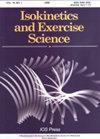Cryotherapy effects on knee proprioception and quadriceps performance in healthy college students
IF 0.6
4区 医学
Q4 ENGINEERING, BIOMEDICAL
引用次数: 0
Abstract
BACKGROUND: Cryotherapy is widely utilized for therapeutic purposes, yet its specific effects on knee joint proprioception and quadriceps muscle performance in healthy individuals remain unclear. This study addresses this gap by examining the impact of a 20-minute cryotherapy session on knee joint proprioception and related muscle parameters in a cohort of healthy college students. OBJECTIVES: To investigate the effects of cryotherapy on knee joint proprioception and quadriceps muscle peak moment, work and power in healthy college male and female students. METHODS: Thirty-two healthy students, aged 19–23, underwent a 20-minute cryotherapy session using Cryogel packs applied to the anterior thigh and knee. An isokinetic dynamometer measured knee joint proprioception and quadriceps muscle parameters before, immediately after, 10-min, and 20-min post-cryotherapy. RESULTS: Proprioception values did not significantly differ between genders or post-tests (p> 0.05). However, the female group exhibited significantly lower moment, power, and work values compared to males (p< 0.05). No significant differences were observed within or between post-tests in moment, power, and work for both genders (p> 0.05). CONCLUSIONS: A 20-minute cryotherapy application demonstrated no adverse effects on knee joint proprioception or quadriceps muscle metrics in healthy college students, supporting the safety of cryotherapy in this context.冷冻疗法对健康大学生膝关节本体感觉和股四头肌表现的影响
背景:冷冻疗法被广泛用于治疗目的,但其对健康人膝关节本体感觉和股四头肌性能的具体影响仍不清楚。本研究通过考察 20 分钟冷冻疗法对健康大学生膝关节本体感觉和相关肌肉参数的影响,填补了这一空白。目的:研究冷冻疗法对膝关节本体感觉和相关肌肉参数的影响:研究冷冻疗法对健康男女大学生膝关节本体感觉和股四头肌峰值力矩、功和力的影响。方法:32 名年龄在 19-23 岁之间的健康学生接受了 20 分钟的冷冻治疗,使用 Cryogel 包敷在大腿前侧和膝关节上。在冷冻治疗前、治疗后、治疗后 10 分钟和 20 分钟,用等速测力计测量膝关节本体感觉和股四头肌参数。结果:不同性别和测试后的本体感觉值没有明显差异(P> 0.05)。然而,与男性相比,女性组的力矩、力量和功值明显较低(P< 0.05)。男女组的力矩、功率和功值在内部或后测之间均无明显差异(P> 0.05)。结论:20 分钟的冷冻疗法对健康大学生的膝关节本体感觉或股四头肌指标没有不良影响,支持冷冻疗法在这种情况下的安全性。
本文章由计算机程序翻译,如有差异,请以英文原文为准。
求助全文
约1分钟内获得全文
求助全文
来源期刊

Isokinetics and Exercise Science
医学-工程:生物医学
CiteScore
1.20
自引率
14.30%
发文量
37
审稿时长
>12 weeks
期刊介绍:
Isokinetics and Exercise Science (IES) is an international journal devoted to the study of theoretical and applied aspects of human muscle performance. Since isokinetic dynamometry constitutes the major tool in this area, the journal takes a particular interest in exploring the considerable potential of this technology.
IES publishes studies associated with the methodology of muscle performance especially with respect to the issues of reproducibility and validity of testing, description of normal and pathological mechanical parameters which are derivable from muscle testing, applications in basic research topics such as motor learning paradigms and electromyography. The journal also publishes studies on applications in clinical settings and technical aspects of the various measurement systems employed in human muscle performance research.
The journal welcomes submissions in the form of research papers, reviews, case studies and technical reports from professionals in the fields of sports medicine, orthopaedic and neurological rehabilitation and exercise physiology.
文献相关原料
| 公司名称 | 产品信息 | 采购帮参考价格 |
|---|
 求助内容:
求助内容: 应助结果提醒方式:
应助结果提醒方式:


